Trump and North Korea talks: Strange optics of the North Korea announcement
- Published
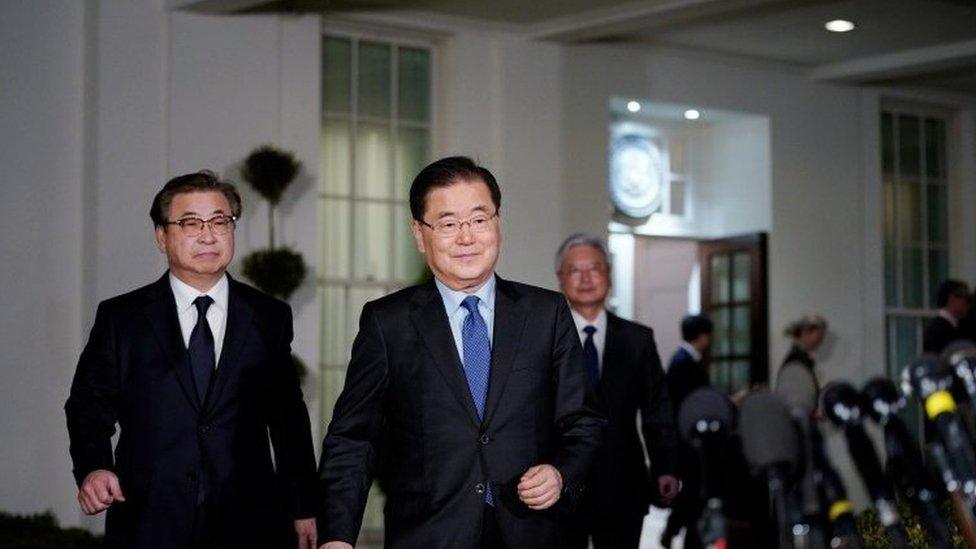
The three South Koreans strode across the lawn to meet reporters to deliver the statement
When South Korea's national security adviser stood on the front lawn of the White House and delivered the news that North Korea's Kim Jong-un and US President Donald Trump would meet by May, a piece of history was made. But analyst Ankit Panda's dissection of that moment and the extraordinary statement shows that all may not be as it seems.
There was something profoundly odd about the optics of this announcement. Three South Koreans - National Security Adviser Chung Eui-yong, Suh Hoon the top spy chief, and the ambassador to the US Cho Yoon-je - stood shoulder-to-shoulder speaking to eagerly-gathered reporters outside the West Wing.
Without any American officials present, it very much placed this entire diplomatic initiative in South Korea's hands.
One could easily walk away sensing that the United States wasn't entirely enthusiastic about this endeavour.
It followed a curious and historic week of Korean peninsula news showing that shuttle diplomacy is back in a big way, with the South Koreans in the driver's seat.
Chung Eui-yong addresses news conference
Two of the South Koreans on the White House lawn, Mr Chung and Mr Suh, had just been received by reclusive North Korean leader himself, before speedily making their way to the US where they briefly met President Trump.
Following that meeting, Mr Chung delivered another statement, outside the West Wing of the White House, on a street with a gaggle of eager reporters before him. In this he announced - on behalf of Donald Trump - that the US president would accept an invitation to meet the North Korean leader.
In the span of just three days, South Korean envoys had spoken for Kim Jong-un and Donald Trump on both sides of the world.
So what did the statement really tell us?
This is what Mr Chung read to reporters:
1. "Today I had the privilege of briefing President Trump on my recent visit to North Korea. I'd like to thank President Trump, the vice-president and his wonderful national security team including my close friend General McMaster."
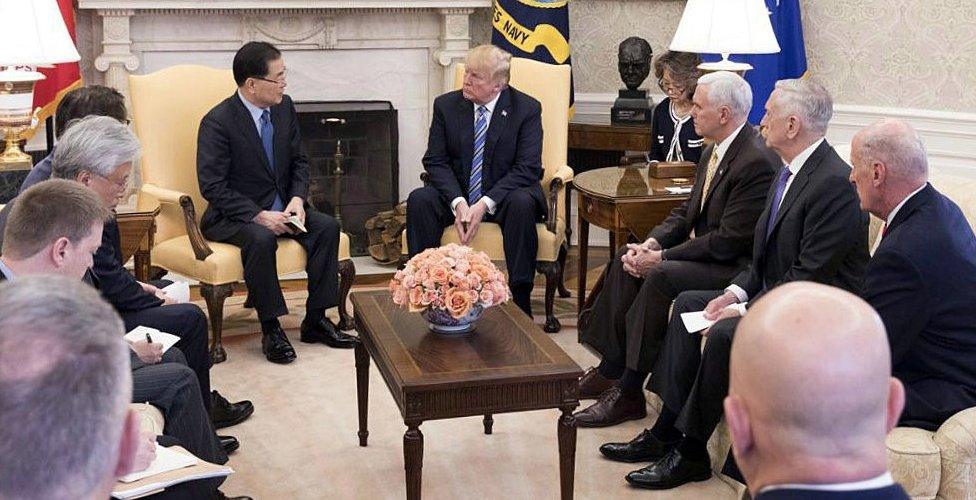
The South Koreans briefed Mr Trump days after their meeting in Pyongyang
Mr Chung will meet Gen HR McMaster on Friday to presumably hammer out a path forward. It's notable that the US national security adviser chose not to accompany his counterpart, creating the awkward optics of the South Koreans going it alone in arranging the US-North Korea summit.
2. "I explained to President Trump that his leadership and his maximum pressure policy together with international solidarity brought us to this juncture. I expressed President Moon Jae-in's personal gratitude for President Trump's leadership."
The South Koreans have realised that Trump responds well to flattery. Seoul has to acknowledge the US-backed policy of "maximum pressure", which has produced at least some results. Kim Jong-un acknowledged the biting effect of sanctions during his New Year's Day address - the same speech where he extended the Winter Olympics olive branch to the South.
3. "I told President Trump that in our meeting, North Korean leader Kim Jong-un said he is committed to denuclearisation. Kim pledged that North Korea will refrain from any further nuclear or missile tests."
This is repetition of what Mr Chung had announced in Seoul on his return from Pyongyang. Mr Chung, however, did not repeat that Mr Kim included a conditional in his offer to denuclearise, which is that his regime's security would have to be assured. The North Koreans have also long called for the end of the United States' "hostile policy" toward them, which may include the departure of US troops from South Korea.
4. "He understands that the routine joint military exercise between the Republic of Korea and the United States must continue and he expressed his eagerness to meet President Trump as soon as possible."
This is an important assurance in the context of the US-South Korea alliance, but it's a highly uncharacteristic statement from a North Korean leader. Pyongyang's behaviour once the postponed exercises - which infuriate the North - begin on 31 March will be far more telling of its actual feelings about the exercises. Last year, North Korea conducted multiple ballistic missile launches during this period.
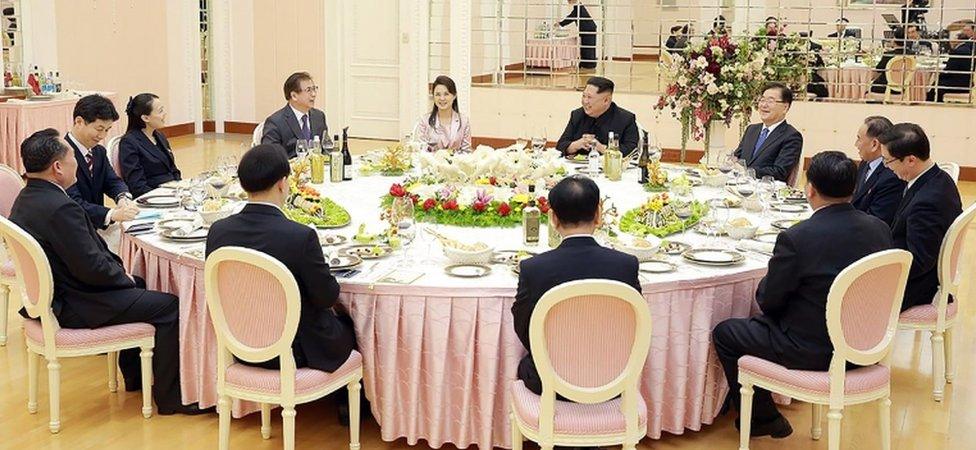
The image of the envoys with North Koreans in Pyongyang earlier this week marked the beginning of a week of shuttle diplomacy
5. "President Trump appreciated the briefing and said he would meet Kim Jong-un by May to achieve permanent denuclearisation."
This is where the headlines have focused and it is the big piece of substantively new information in Mr Chung's announcement in Washington. A venue and an agenda are both left ambiguous - presumably for the United States and North Korea to hammer out in the coming weeks.
6. "The Republic of Korea, the United States and our many partners around the world remain fully and resolutely committed to the complete denuclearisation of the Korean peninsula. Along with President Trump we are optimistic about continuing a diplomatic process to test the possibility of a peaceful resolution.
"The Republic of Korea, the United States, and our partners stand together in insisting that we not repeat the mistakes of the past, and that the pressure will continue until North Korea matches his words with concrete actions. Thank you."
Mr Chung's statement concludes with optimistic boilerplate, but noticeably does not include any affirmation of the alliance with the United States directly. The US is grouped along with "partners". Curiously, he refers to Kim Jong-un's "words", even though all of North Korea's words regarding this supposed diplomatic breakthrough have come through South Korea.
The announcement is undoubtedly significant and a Trump-Kim summit would make the history books, but it's far from clear that North Korea has committed to what South Korea has assured the United States it has committed to, or that Washington is ready for a productive diplomatic process with Pyongyang.
Ankit Panda is a North Korea expert and senior editor at The Diplomat., external Follow him on @nktpnd , external
- Published9 March 2018
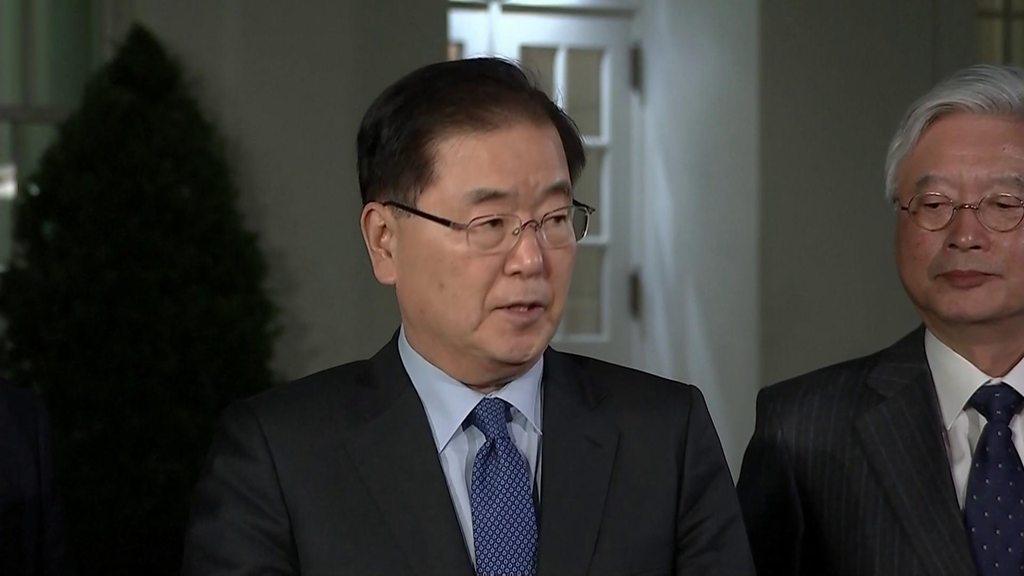
- Published9 March 2018
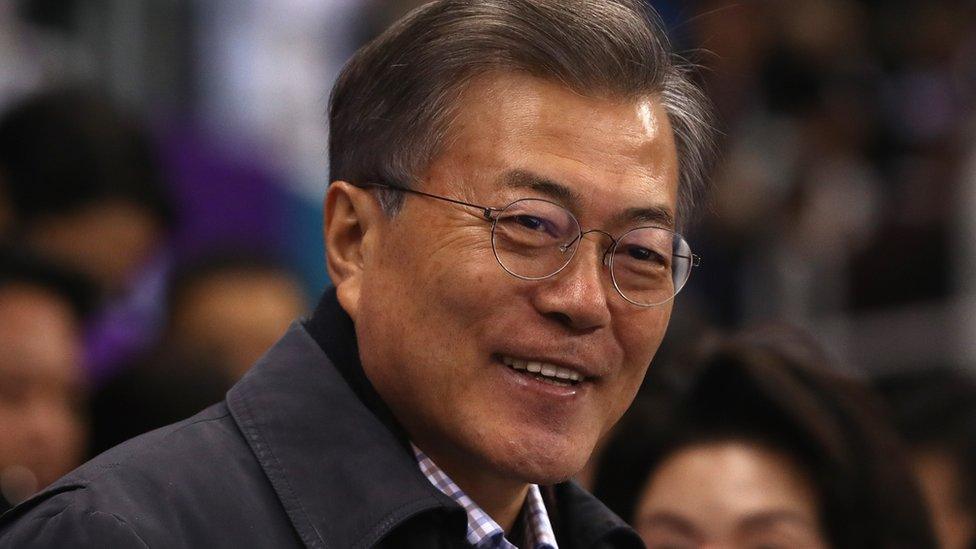
- Published9 March 2018
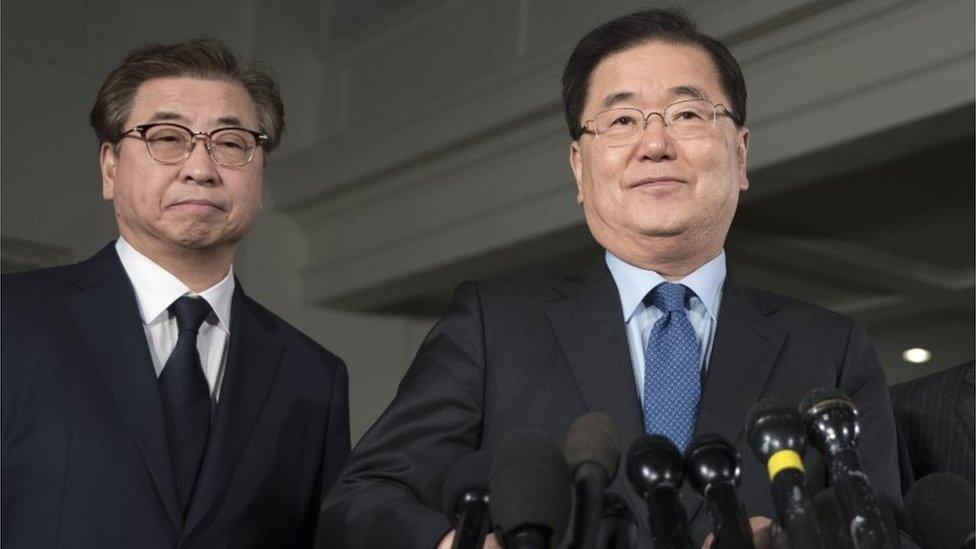
- Published9 March 2018